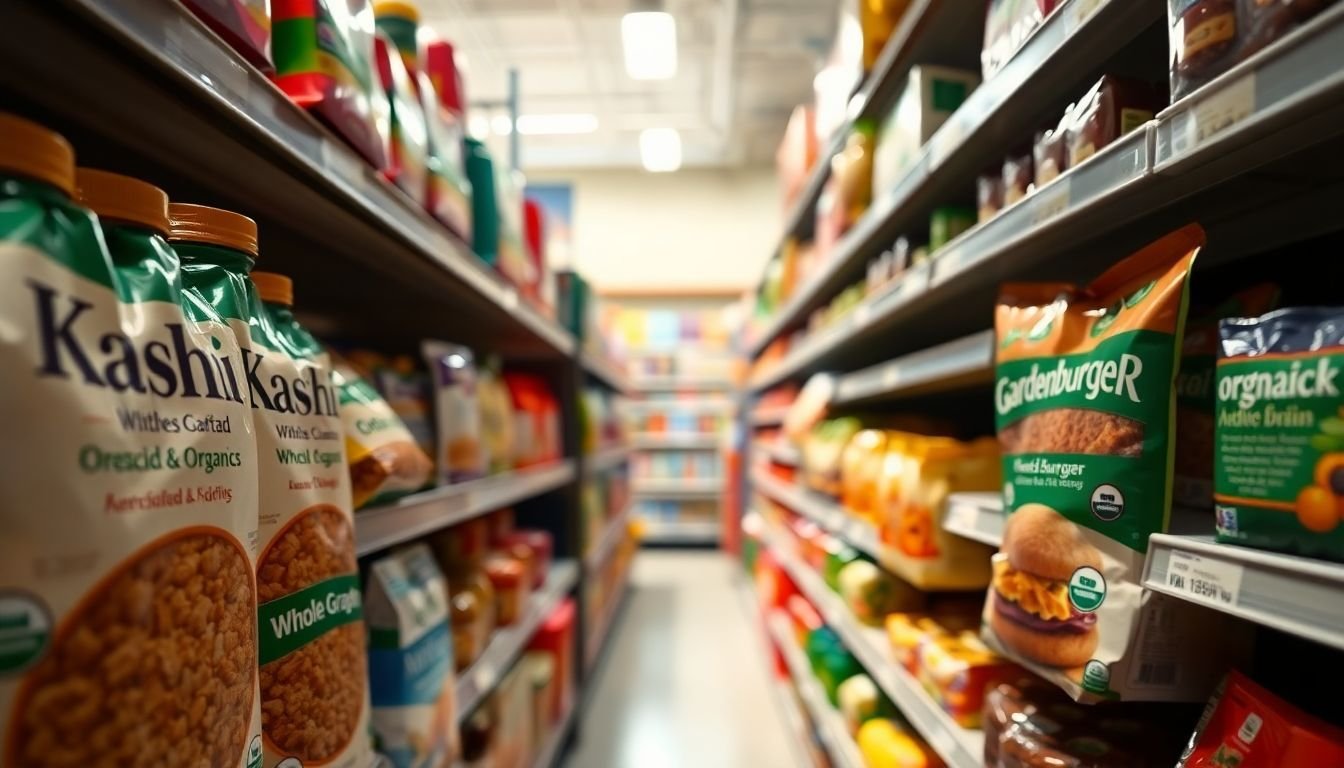You try to pick healthy foods when you shop. You look for snacks and drinks that say they’re good for you. But sometimes, what looks healthy isn’t as good as it seems. Did you know some big companies own a lot of health food brands? And these aren’t always the best choice for your diet.
This article talks about “10 Health Food Brands That Aren’t” as nutritious as you think. A lot of people choose products like granola bars or plant-based milk, thinking they picked the healthiest option.
We will show you which brands might not be as great as they seem. Keep reading to learn more!
Misconceptions about Health Food Brands

Many people think health food brands like Kashi and Gardenburger are good for you. They see “organic” or “whole grain” on the label and put it in their cart without thinking twice.
But, some big companies own these brands and don’t want you to know exactly what’s in your food. This is a big deal because the stuff added to make your food taste better, like extra sugar or artificial sweeteners, can be bad for you.
Just because it says ‘organic’ doesn’t mean it’s always good for you.
I once picked up a bottle of fruit juice from one of these popular brands, thinking I was making a healthy choice. Later, I found out that this drink had as much sugar as a soda! It was surprising and made me check labels more carefully from then on.
Checking things like added sugars, whether something is truly whole grain, and if there are any artificial ingredients helped me make better choices at the grocery store.
Proposition 37 and Its Implications
Proposition 37 was significant in California, mandating a label for food products containing GMOs. Exempt from this rule were meat, dairy, and alcohol. The regulation also prohibited labeling these foods as “healthy.” Supporters of Proposition 37 aimed for transparency about food ingredients, envisioning that this would aid individuals in making more informed purchasing decisions during grocery shopping or snack selection.
Yet, there were those who disagreed, arguing that such measures wouldn’t address major food safety issues. They also expressed concern that the extensive labeling might inflate food costs across the board – affecting all from farmers to consumers buying primary products like milk or bread.
Discussions with friends about this issue prior to the vote revealed a collective internal struggle. Knowledge about the contents of our almond milk or veggie crisps seemed appealing, but concerns loomed about potential increases in our grocery bill due to the new GMO labeling regulations.
Major Players in the Proposition 37 Debate
Major food manufacturers are in a big debate over Proposition 37. This law would make them label foods that have GMOs. GMO stands for genetically modified organisms. These are plants or animals changed in labs to make them grow faster or resist pests. Big companies like Pepsi, Coca Cola, General Mills, Nestle, ConAgra, and Smuckers don’t want this law. They say it will make food more expensive. They are spending lots of money to fight against it.
Here is a quick look at who is who in this debate:
| Company | Position on Proposition 37 | Money Spent (if available) |
|---|---|---|
| PepsiCo | Opposed | Not specified |
| Coca Cola | Opposed | Not specified |
| General Mills | Opposed | Not specified |
| Nestle | Opposed | Not specified |
| ConAgra | Opposed | Not specified |
| Smuckers | Opposed | Not specified |
These companies make a lot of food and drinks you might know. They believe Proposition 37 will make their costs go up. This is because they would have to change their labels and maybe even their ingredients. They think this will make your food cost more money.
Many people are watching this debate. They care about what’s in their food. They want to know if it has GMOs. This debate is important because it could change how food is made and sold in the future.https://m.youtube.com/watch?v=WfPqlTRFnLU
Top 10 Health Food Brands Owned By Major Corporations
Many health food brands that seem good for you are actually owned by big companies. These brands include drinks, cereals, and snacks that may not be as healthy as they look.
Naked drinks (parent company: PepsiCo)
Naked drinks originate from PepsiCo, a substantial corporation producing a myriad of food and beverages. These smoothies may give the impression of being healthy due to their fruit and vegetable content.
It’s critical to scrutinize the nutrition label. They could potentially contain a significant sugar quantity, comparable to soda or candy bars. Excessive consumption could lead to surplus calories, which could be a setback if you’re pursuing fitness.
Make it a habit to scrutinize the nutrition facts label prior to savoring your drink.
PepsiCo stood in opposition to Proposition 37. This legislation aimed to mandate companies to reveal if their products contained scientifically modified ingredients. Hence, when you grab Naked juices under the impression that they’re purely fruit and nothing else, it’s crucial to be aware that there’s a deeper insight into what’s residing inside.
Odwalla and Simply Orange (parent company: Coca Cola)
Coca Cola owns Odwalla and Simply Orange. They make juices and smoothies. Many people think these drinks are healthy. But, they can have a lot of sugar. Drinking too much sugar is bad for your heart.
Coca Cola spends a lot of money to fight against Proposition 37. This law wants labels on foods that have GMOs.
I tried Simply Orange and an Odwalla smoothie last week. They tasted good but were very sweet. I looked at the bottle and saw lots of sugar listed in the ingredients. This surprised me because I thought they were better for me than soda or other sweet drinks.
Kashi (parent company: Kellogg)
Kashi may look like a healthy choice for your breakfast with its whole grains and plant-based meals. But, Kellogg owns Kashi. Kellogg fought against Proposition 37. This law wanted to make companies label food that has GMOs (genetically modified organisms).
Even if you think you’re picking a heart-healthy option, some Kashi products might not be as pure as they seem.
I once picked up a box of Kashi cereal thinking it was the best choice for my diet high in whole foods and low in processed ones. But then, I learned about the GMO debate and how Kellogg didn’t support clearer labels.
It made me double-check what “health food” really means. Always read the labels on your food to see what’s truly inside.
Morningstar (parent company: Kellogg)
Morningstar, owned by Kellogg, makes food that seems good for you. They focus on plant-based meats and snacks. But Kellogg fights against Proposition 37. This law would make companies label foods with GMOs.
So think about it. If Morningstar really cared about health, why would their parent company not want you to know what’s in your food?
Always read the labels on your food, even if it looks healthy.
Garden Burger (parent company: Kellogg)
Garden Burger is made by Kellogg. This company makes food that many people think is good for them. But, you might want to look closer. Kellogg is not open about what they put in their foods.
They fight against clear labels on their products. This makes it hard to know if the veggie burgers you eat are healthy.
I tried a Garden Burger. It tasted okay, but then I learned more about its ingredients and Kellogg’s actions. This made me rethink my choice. If you care about eating real health foods, checking labels is key.
Look for simple ingredients and companies that share everything openly.
Bear Naked (parent company: Kellogg)
Bear Naked is a brand you might pick when looking for healthy breakfast options. It’s known for granolas and other whole-food snacks. But Kellogg, a big food company, owns Bear Naked.
Kellogg fought against Proposition 37. This law wanted labels on foods that are genetically modified.
Kellogg says they offer nutritious choices. But some Bear Naked products have lots of sugar and processed ingredients. This is not what you expect from food that seems good for you.
Next time you reach for a snack, check the label carefully to see what’s really inside.
Cascadian Farms (parent company: General Mills)
Cascadian Farms is one brand you might pick from the shelf, thinking it’s a smart choice for your health. Its parent company, General Mills, plays a big part in this picture but not just by offering foods that seem good for you.
They are also known for spending a lot of money to oppose Proposition 37. This law wanted labels on foods that have GMOs (genetically modified organisms).
I tried Cascadian Farms cereals and bars, drawn by their “natural” look and promises of organic ingredients. It felt right until I learned about GMO opposition efforts. It was surprising and made me think twice about what “healthy” really means.
Knowing who makes your food changes how you eat.
Larabar (parent company: General Mills)
Larabar makes snack foods that seem healthy. They use dried fruit, nuts, and spices. This sounds good for you, right? But there’s more to it. General Mills, a big company that owns Larabar, did not support Proposition 37.
This law wanted labels on foods with modified plants.
I tried Larabars because they looked like a smart choice for snacking. They taste great and the ingredients list is short. But then I learned about their parent company’s views on food labeling.
It made me think twice about what “healthy” means in grocery stores today.
Horizon (parent company: Dean Foods)
Horizon is a brand that makes milk products. It is owned by Dean Foods. Many people pick Horizon thinking it’s good for their health because it comes from plants or doesn’t have much fat.
But, Dean Foods fights against Proposition 37. This rule would make labels tell you if food has stuff in it that some folks don’t want to eat.
You might see Horizon products and think they’re great for avoiding heart disease or keeping your diet balanced. Yet, the truth is more complex. The company behind Horizon doesn’t want clear labels on foods.
So, even if you try to eat less meat or choose plant-based milks, be careful about where your food comes from and what’s really in it.
Silk (parent company: Dean Foods)
Silk is a popular choice for plant milks, assumed to be a wholesome selection. Yet, are you aware that its parent company, Dean Foods, doesn’t advocate for unambiguous ingredient labeling? This information could influence your perception about the actual contents of your sustenance.
Dean Foods has a strong market presence but lacks in clarity.
Opting for Silk implies that you may lack comprehensive details about your beverage. If understanding the constituents of your nourishment is pertinent to you, this could be significant.
Always scrutinize labels and keep in mind that all health foods may not be as beneficial as they appear.
Brands Supporting Proposition 37
Some brands really stand by healthier choices and showed their support for Proposition 37. This included companies like Nature’s Peak, which offers everything from fruits to veggies in their products; Organic Valley milk, known for its dairy items straight from farms; Amy’s Organic, popular for ready-to-eat meals; Annie’s Organic that makes snack foods and sauces; and Clif Bar, famous for energy bars.
For more details on what makes these brands different and better options, keep reading.
Nature’s Peak
Nature’s Peak stands behind Proposition 37 because they want you to know what’s in your food. They think being clear about labels is key. This means when you pick up a product from Nature’s Peak, they’re showing their support for telling you if foods are made with genetically modified organisms (GMOs).
Transparency is big for them.
This brand wants to make sure you get the truth on labels so making choices about what you eat is easier. With Nature’s Peak, it’s not just about eating; it’s knowing what’s in your food that matters too.
Organic Valley milk
Organic Valley milk stands out because it backs Proposition 37. This shows they care about what goes into your food. They want you to know all the ingredients in your dairy products.
You can feel good choosing their milk since they push for clear labels.
I tried Organic Valley milk and noticed a difference. It tastes fresh and makes me feel better about my breakfast choices. Seeing the label, I know exactly what I’m drinking—no hidden chemicals or surprises.
This brand is serious about offering a healthy option in a market full of processed foods and artificial flavorings.
Amy’s Organic
Amy’s Organic stands out because it supports Proposition 37. This means they want you to know if your food has GMOs. They believe in being open about what goes into their products.
From pre-made smoothies to frozen meals, Amy’s uses ingredients that are easy to understand. You might have tried one of their veggie burgers or bowls and noticed how they list every ingredient on the package.
Eating Amy’s Organic foods gives you a clear choice. You can pick foods that match a balanced diet without hidden surprises. They make it easier for you to avoid ultra-processed foods and choose healthier options instead.
Their support for transparency helps you make informed decisions about what you eat every day.
Annie’s Organic
Annie’s Organic is a brand that cares about what you eat. They show their support for Proposition 37. This means they want all food labels to tell the truth about ingredients. If a snack or meal has stuff in it from a lab, Annie’s thinks you should know.
They make foods like macaroni and cheese, snacks, and cereals with organic ingredients. Eating their products is one way to avoid too much processed food.
You’ve maybe tried their bunny-shaped cookies or creamy mac and cheese without knowing how they stand up for good health choices. They choose ingredients carefully, aiming to keep things like artificial colors out of your kitchen.
By picking Annie’s Organic, you’re also saying yes to knowing more about what’s in your food and keeping it as natural as possible.
Clif Bar
Clif Bar backs Proposition 37. They want you to know what’s in your food. This company believes in showing everything clearly on their labels. People like you can see if there are things like high sugar or low protein.
Clif Bar makes it easier for you to choose healthy options by being open about their ingredients.
They also focus on making snacks that fit a balanced diet. Clif Bars have energy for sports, vitamins for health, and fiber for digestion. Unlike some brands that hide unhealthy parts, Clif Bar tries to help its eaters stay informed and make good choices.
Conclusion
You might think some health food brands offer the best choices. Yet, many under big company names may not be as good as you hoped. It’s wise to check what you eat and drink. Look for labels and know who makes your food.
This helps you pick truly healthy items. Stay informed and make better choices for your meals and snacks.
FAQs
1. Are all health food brands as nutritious as they claim to be?
Not always. Some brands market products like sports drinks, protein bars, and energy beverages as healthy options but these can contain high amounts of sugar or saturated fat.
2. Can you give examples of some misleading “health” foods?
Sure! Foods like veggie chips might seem healthier than potato chips, but they are often deep fried just the same. Also, diet sodas may have low-calorie content, yet they can lead to weight gain due to artificial sweeteners.
3. What should I look out for when buying supposedly healthy foods in a supermarket?
Always check the label for hidden sugars or fats in packaged foods such as muesli and premade smoothies. Even items labeled ‘low fat’ or ‘low carb’ could still be high in refined grains which lack nutritional value compared to whole wheat alternatives.
4. Is it true that not all milk alternatives are good for you?
Yes! While nut milks are popular among vegetarians and those with gluten-related disorders, not all milk alternatives provide the daily value of macronutrients needed for balanced diets like unsweetened yogurt or black beans do.
5. How does social media affect our perception of what is healthy?
Social media platforms often promote certain food trends without considering their nutritional profile leading people towards choices like coconut oil over unsaturated cooking oils despite higher levels of saturated fat.
6. What are some truly nutritious food options we should consider instead?
Opting for fresh fruits over fruit juices or dried fruits can help avoid added sugars while choosing sushi made with tempeh rather than processed meats provides omega-3s without unnecessary salted additives.
- Discover 10 Employee Health Benefits Cheaper Than Insurance In 2024 - November 9, 2024
- 4 Common Money Mistakes Parents Make And How To Avoid Them - November 9, 2024
- Mastering Your Retirement Strategy: Essential Steps For Financial Security - November 9, 2024













